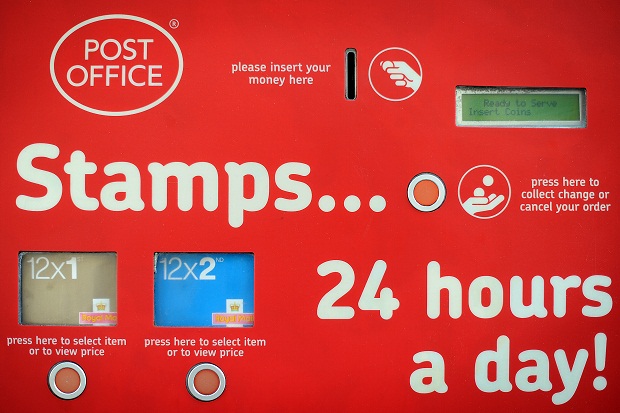Well, the whole Royal Mail privatisation is going terrifically well, isn’t it? I’m not talking about the pricing of the issue which has obsessed most of the pundits. I’m talking about users. The latest exciting new development from this privatised company with the Queen’s head on the product is that it is to use new technology to let companies know that their promotional material – junk mail as it’s affectionately known to its recipients – has been safely put through the door, so they are now free to cold call households to follow up the delivery. Nice!
But it’s the impact on the price of stamps that really gets me going. I may be the last person on this site to use real stamps for actual cards and letters, though they’re now a supplement to email. And for those who have not passed the door of a post office for a year or two, let me pass on word from the queue: it’s really, really expensive. A card I sent to Ireland yesterday cost £1.28, more than the actual card. And, let us never forget the rise in ordinary stamp prices in preparation for privatisation. Last year, the price of a first class stamp rose from 46p to 60p. Second class stamp prices rose from 36p to 50p: or ten shillings, as many pensioners will think about it.
The rise followed a decision by Ofcom to lift the price cap on first class stamps. I honestly can’t think of any industry, particularly a monopoly industry, that could get away with a price increase on that scale, of more than a third, with barely a peep from anyone in government. It also followed the government separation of Royal Mail from the Post Office, a decision about as rational as separating the management of rail track from train operations.
Last week, the Spectator’s piece on the dodgy personages who feature on the Renaissance Nativity scenes on classy Christmas cards made amusing reading (though I’d feel better about our oligarchs if they did have a redemptive devotional side). Well the real question is whether ordinary people on ordinary salaries will have to forego sending Christmas cards at all because they can’t afford the postage. It’ll be then that the sheer scale of the hike hits you. Even before the increases, personal mail accounted for only about a tenth of Royal Mail business but from the punters’ end of things, this aspect of Royal Mail is a genuine public service; a necessary bit of social infrastructure, one that older people, particularly, feel wedded to.
The reassuring news in the wake of privatisation is that Moya Green, the much-admired (in the business community) boss of Royal Mail says that she doesn’t envisage increasing the price of a first class stamp to £1, not just yet (‘circumstances change’), though she justifies price increases on the basis that the average spend by British households on postage is 50p a week. ‘We are very proud of the value that we provide for 60p, but we also know that in that field, where we have structural decline on the letters side, we have to be very careful about pricing,’ she later told Sky News in an interview to mark the first day of unconditional trading in Royal Mail shares.
Let me, in the mildest fashion I can manage, suggest another possibility to Ms Green, viz, that one reason why there is structural decline in letter-sending is that it’s prohibitively expensive. In other words, the decline in letter-writing that email brought about has been hugely aggravated by the cost of sending the letters once written. What she sees, in short, as a symptom of the problem is a contributory cause.
In the prospectus for the sale of shares published last month, the Government acknowledged that price rises were possible but said:
‘Despite the significant increases in prices that were implemented in April 2012, the UK letter market remains competitively priced when compared with European countries. Following such significant increases (including above RPI [retail price inflation] price increases in [the full year ending 2012], the directors expect any price increases to be broadly in line with the RPI over the three financial years ending in FYE 2016.’
Can anyone work that out? My own reading of it is that after 2016 the new owners of Royal Mail will be able to charge what they like. In other words, the price of an important service – an important public service – is going to be at the mercy of the major shareholders of Royal Mail. Of course, businesses like Amazon are going to be able to make use of a competitive parcel delivery market to get the best possible postage rates; the rest of us won’t. We’ll have to lump the rise in stamp prices, sending ever fewer cards and letters, with the decline in letter-sending then used by Ms Green as a justification for still further price rises. We’ll be left with a de facto monopoly supplier which behaves like a private business. Actually, when it comes to stamps, I like state run monopolies. At least ones that don’t rob you blind.







Comments